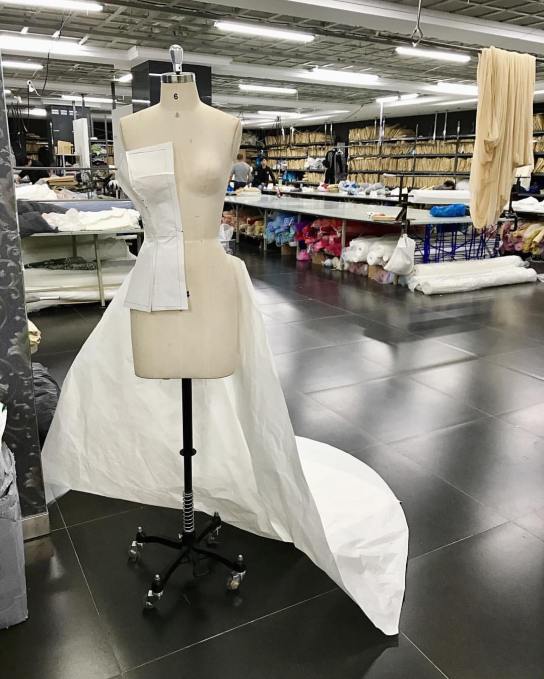Wedding-dress shopping should be a fairy tale, but it’s usually a scam. You pay $5,000 for a dress that costs $200 to make. Bridal boutiques hide the brands on their dresses so you can’t comparison shop, and inflate lead times so you’re pressured to buy on the spot for fear the dress won’t be ready in time. And in the end, you get an overpriced cookie-cutter dress, all because the industry exploits sentimentality and tradition.
Anomalie does it differently. The startup founded by a former Apple supply chain sorceress officially launched this week to bring a transparent, tech-inspired approach to what brides wear on their special day. For a wedding dress made with the same fabrics by the same manufacturers as the boutiques, it only charges around $1,200, and you get to customize how it looks.
How the dress disruptor works
First, you submit any photos, Pinterest boards or ideas for what you want and do a phone consultation with one of Anomalie’s designers. Forty-eight hours later you get sketches of how your dress could look, with a chance to give feedback. You’re referred to a local tailor to get all your measurements, and they can also do any necessary alterations just before the wedding. Anomalie dresses typically cost between $800 and $1,500 depending on materials, paid up front.

The dress is guaranteed to arrive within three months. Along the way you receive a swatch of the material to review the color, fabric and feel, plus photo and video updates as the dress is cut and sewn. Worthy of an unboxing party with the bridesmaids, the dress arrives in a big beautiful package. Anomalie claims their dresses are just as high-quality at a fraction of the price, and you get to brag about how you helped design it. And if you don’t like the dress, Anomalie offers a 100 percent refund or they’ll rework the gown.
“Anomalie came out of my own frustrations with buying a wedding dress,” says co-founder Leslie Voorhees. “I got fed up and investigated.” Luckily, she knew just how to examine a supply chain.

Before going to Harvard Business School, she’d been possibly the youngest person running a whole factory for Nike over in Indonesia. Later she managed product operations for the Apple Watch in Shanghai. She soon discovered that “most dresses are not made by the brand but by third-party suppliers.”
It turned out there was no reason for the $3,000 to $5,000 markup on wedding dresses beyond that no one had undercut the greedy boutiques. “When you make the same product white and attach the word ‘bridal,’ it makes it cost 5X to 10X more. It’s offensive to a woman who understands how things are manufactured.” The New York Times recently reported how low information transparency in the wedding business has kept prices high.
So Voorhees sidestepped the boutiques and got her own wedding dress made directly. Within a week of showing it off, she had friends and friends of friends throwing money at her to make them a custom dress for less. Voorhees had discovered one of the last massive-markup businesses that hadn’t been redefined by startup methodology. She left Apple, and with her Stanford / Harvard / Edelman consultant husband Calley Means, founded Anomalie. [Disclosure: I know Means from college]
 The fledgling startup has been doubling revenue each month since soft launching this summer, and is now raising a seed round from venture and strategic investors. It’s currently working with 500 potential customers, and buyers are frequently referring friends. While 500 might not sound like a lot, 800 dresses at $1,200 would equal a million in revenue. Wedding dresses in the U.S. are a $5 billion-a-year market. As for profit, Means says, “We’re making good money making them for $1,200.”
The fledgling startup has been doubling revenue each month since soft launching this summer, and is now raising a seed round from venture and strategic investors. It’s currently working with 500 potential customers, and buyers are frequently referring friends. While 500 might not sound like a lot, 800 dresses at $1,200 would equal a million in revenue. Wedding dresses in the U.S. are a $5 billion-a-year market. As for profit, Means says, “We’re making good money making them for $1,200.”
Voorhees admits that Anomalie won’t compete with the highest-end designers like Oscar de la Renta or Vera Wang, which reportedly tried to charge brides $482 just to try on a dress. If price is no concern, Anomalie can’t offer the same flashy brand or boutique visit experience. And some brides may balk at not trying on their dress until later, despite the refund policy.
But the startup doesn’t mind customers going “show rooming,” where they visit a traditional boutique to gather inspiration for what they want Anomalie to make them. One customer told TechCrunch, “The Anomalie process is phenomenal! I gave Calley and Leslie a compilation of ideas and watched the gown come to life: approving fabric samples, reviewing the pattern, and seeing pictures of hand-beading.”
Reinventing tradition
Between the low-budget David’s Bridal strip-mall chain and the elite fashion houses, there are billions in sales to grab in the middle-market. Getting that far will require Anomalie to “create a brand that people relate to, for the smart, empowered woman,” Means says.

It will also have to tackle the tough challenge of scaling up production for a type of product that must be flawless. “This is what kept me up at Nike and Apple,” says Voorhees. “This has to be delivered on time, and the products have to be beautiful and perfect.” Eventually, Anomalie’s founders imagine offering pre-made designs with modular customization, as they’re already seeing trends and similar designs submitted by customers.
Perhaps the biggest threat to Anomalie’s success is the entrenchment of the status quo. Brides dream of trying on their dream dress for the first time, but that’s typically been before buying it, not after. The startup must consistently provide a dreamy, VIP experience to turn every wedding photo into viral marketing.
 If it can establish itself with bridal dresses, Anomalie will have built a powerful wedge into the wedding industry as a whole. It’s a similar strategy to Joy, a Y Combinator startup building wedding sites. “The wedding dress is the most important purchase of the chief decision maker in a $90 billion market,” Means explains. “If we can gain that customer’s trust, the bride decides almost everything.” Because dresses are one of the first buys in the wedding planning process, Anomalie could earn referral fees from other vendors for flowers and catering, or build out its own services.
If it can establish itself with bridal dresses, Anomalie will have built a powerful wedge into the wedding industry as a whole. It’s a similar strategy to Joy, a Y Combinator startup building wedding sites. “The wedding dress is the most important purchase of the chief decision maker in a $90 billion market,” Means explains. “If we can gain that customer’s trust, the bride decides almost everything.” Because dresses are one of the first buys in the wedding planning process, Anomalie could earn referral fees from other vendors for flowers and catering, or build out its own services.
Indeed, 2.2 million brides buy dresses in the U.S. each year, yet startups have largely overlooked the problem. Perhaps that’s driven by the unfortunate dominance of men in tech, and the assumption that you need a brick-and-mortar boutique to find a dress.
This virgin market leaves room for Anomalie to rethink everything. It’s planning to hire product managers from logistics-centric tech companies, then start them as customer support reps to learn what brides want from the startup.
“The industry is taking advantage of an emotional time,” Voorhees concludes. “It should be a fun and happy purchase.” Modern brides are ready for a company tailored to fit them, just like their dress.































Comment